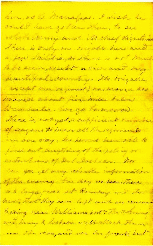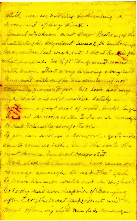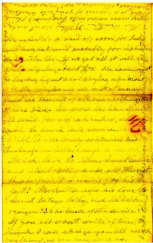Letter to Eleanor Stuart Brooks
Summary:
Andrew Brooks writes to his mother that he expects his
brigade to be called to Winchester the following day. He also
expresses concern that he does not know General Jackson's plans
and that the government has been "negligent" in paying southern
soldiers.
ALS
.pp
November 21, 1861
Andrew Brooks to Eleanor Stuart Brooks, November 21, 1861
Notes
Dear Ma,
After waiting and
looking, a long time, for a letter
from home, Mary's reached us a
day or two ago, and gladly was it
received and read, telling us all the
news and that you were getting so
much better.[2]
I hope you will be
careful of yourself, and still continue
to improve until you are entirely
well. Mary said Father and
Uncle John were
talking of coming
to see us. I am very much
afraid they will take it out in talk.
However, I hope not, but will look
for them before long.
If they
dont
come, I hope Emmett will, as he
spoke of doing. I expect though
he will not be so anxious to come
[page 2]
here, as to Manassas.
I wish he
could have gotten there, to see
the whole Army and its chief dignitaries.
There is only one brigade here and
a few militia, so there is not much
to be seen, except a rich and very
beautiful country. The brigade
(except our regiment) has moved has
moved about five miles below
Winchester. We go
to-morrow.
[3]
There is, not yet, a sufficient number
of wagons to move all the regiments
in one day. We havent been able to
find out any thing of the policy or
intentions of
Genl.
Jackson. Nor
can we get any reliable information
of the enemy. One day we hear, there
is a large force at Romney and the
next, that they have left
and are concen-
trating near Williamsport:
that Loring
and Henry R Jackson will attack them
in the rear, and we in front: but
[page 3]
still we see nothing indicating a
movement of any kind. [4]
General Jackson sent
Major Preston (of the
Institute) his Adjutant General, to
Gen Lovings
Headquarters, last week, but I dont
know for
what purpose.[5] He left the ground covered
with snow. That army is having a very hard
time, and will suffer this winter, if not
carefully provided for. We have had very
high winds and cold weather lately.
We burn a great deal of wood, build large
fires at the doors of the tents, and manage
to keep tolerably comfortable. [6]
If you can send us a comfort, a good wide
one to cover us both. Send the boots the
first chance. I'm most barefooted.
How did [unclear: Tobbin] ever have sense or
courage enough to ask that girl
to have him, or walk out on the floor?
Nobody need ever despair of marrying
after that; the most despondent and
most often rejected can take courage.
[page 4]
We expect to be paid off soon for July
and August and probably for September
and October too. If we get all it will be
quite a pile, about $70. The Government
is too negligent about paying up. Most
of the Company are out of money.
Send us the cost of all our clothing, that
of each piece. An order has been issued
to send for all absentees, who are
able to come into service.
Will Uncle Andy continue his
business in Alleghany?
Much love to him Aunt Sallie
and Aunt Betsy and all the rest.
Has he found a name for his boy
yet? Mr. Reed sends his love to
Aunt Betsy.[7]
Why did
Dr. Walker
resign?[8]
Is he tired of the service?
If you all dont write oftener, I
think I can charge you all with
carelessness as you have done us.
[added: I hope the Yankees wont give us a chance to fight them this winter. If they dont make any more raids into Virginia I think there is a chance of going into Winter Quarters, otherwise not very soon. ]
[added: Write soon to your son,]
[added: Andrew]
Notes
[1] Andrew Brooks failed to include the month in which he wrote this letter. However, contextual clues, such as Andrew's discussion of the movement of the troops and the day of the week, lead us to conclude that the letter was written in November of 1861.
[2] "Mary" is Andrew's sister, Mary Susan Brooks. Apparently their mother Eleanor Stuart Brooks was ill during 1861; see also Andrew Brooks's letter of May 28, 1861, where he asks if "she has improved."
[3] In mid to late November of 1861, the Stonewall Brigade proceeded from Manassas to Winchester in order to join Jackson in defending the Shenandoah Valley. Although the Fourth Virginia lagged behind the rest of the brigade, perhaps because they were waiting for wagons to carry supplies, they soon set up camp at Camp Stephenson, which was four and a half miles outside of Winchester (Robertson, The Stonewall Brigade, 52).
[4] Romney, West Virginia, located on the east side of the South Branch of the Potomac River thirty-five miles northwest of Winchester, was "the eastern key to western Virginia," while Williamsport, Maryland was an important point at which to cross the Potomac (Robertson, The Stonewall Brigade, 58). As Andrew anticipated, the Stonewall Brigade would soon be called on to aid in bringing the western part of Virginia into Confederate control. At the end of 1861, five thousand Union troops under the command of General B. F. Kelley were garrisoned at Romney. In January of 1862, Jackson easily captured Romney, since it had been deserted by Union forces (Bean 81-89; Robertson, The Stonewall Brigade, 59-63). In projecting future fighting, Andrew mentions that he expects the participation of troops commanded by General William W. Loring, who in 1861 led the Army of Northwestern Virginia, and General Henry Roots Jackson (http://home.earthlink.net/~atomic_rom/loring.htm).
[5] On November 4, 1861, Jackson, who had been promoted to major-general, departed from his First Brigade as he proceeded to Winchester to assume command of the Shenandoah Valley (Robertson, The Stonewall Brigade, 166; Turner, 113). Realizing that the Valley needed a stronger defense, Jackson sent Lieutenant Colonel J. T. L. Preston, who had been a professor at Virginia Military Institute, to Richmond to ask for reinforcements. The War Department assigned the First Brigade to defend the Valley along with General William W. Loring's troops, so that Jackson was separated from the First Brigade for only a short time (Bean, 70; Robertson, The Stonewall Brigade, 49-50). General Loring's three brigades did not arrive in Winchester until late December of 1861, so Brooks is probably referring to some communication between Jackson and Loring regarding the planned reinforcment (Robertson, The Stonewall Brigade, 57)
[6] As Andrew reports, weather conditions were miserable when the troops arrived in Winchester. The soldiers shivered as they faced frigid winds and sleet (Robertson, The Stonewall Brigade, 52).
[7] Uncle Andy, or Andrew Stuart, is the the brother of Andrew Brooks' mother Eleanor Tate Stuart Brooks (see also Andrew Brooks' letter of January 23, 1861, where Andrew asks about his uncle's recent marriage to the former Sarah McClure). Aunt Betsy is probably Betsy Brooks, who is listed in the 1860 Census of Augusta County as being twenty-nine years old and as living with Silas and Apatia Brooks, not far from James Brooks' farm.
[8] Dr. Walker is probably George W. Walker, who is listed as a physician in the 1860 census of Augusta County.
Works Cited
Bean, W. G. The Liberty Hall Volunteers: Stonewall's College Boys. Charlottesville: The University of Virginia Press, 1964.
"The Civil War Artillery Page" http://www.lib.uchicago.edu/~cjt1/artillery.html. Chuck Ten Brink. Visited April, 1998
Crenshaw, Ollinger. General Lee's College: The Rise and Growth of Washington and Lee University. NY: Random House, 1969.
Denney, Robert E. The Civil War Years: A Day-by-Day Chronicle of the Life of a Nation. NY: Sterling Publishing Co, Inc., 1992.
Driver, Robert. J. 52nd Virginia Infantry. Lynchburg, Va: H. E. Howard, 1986.
Lankford, Nelson D. "Alexander Robinson Boteler." Encylopedia of the Confederacy. Ed. Richard N. Current. NY: Simon & Schuster, 1993. I: 197-8.
McMurry, Richard. M. "Joseph E. Johnston." Encylopedia of the Confederacy. Ed. Richard N. Current. NY: Simon & Schuster, 1993. II: 859-61.
McPherson, James M. The Atlas of the Civil War. New York: Macmillan, 1994.
Robertson, James. 4th Virginia Infantry. Lynchburg, Va.: H.E. Howard, 1982.
—. The Stonewall Brigade. Baton Rouge: Louisiana State University Press, 1963.
Sublett, Charles W. 57th Virginia Infantry. Lynchburg, Va.: H. E. Howard, 1985.
Turner, Charles W. Old Zeus: Life and Letters (1860-'62) of James J. White (Professor of Greek at Washington College 1852-1893, Captain of the Liberty Hall Volunteers 1861-'62). Verona, VA: McClure Printing Company, Inc., 1983.
Wallace, Lee A. 5th Virginia Infantry. Lynchburg, Va.: H. E. Howard, 1988.

